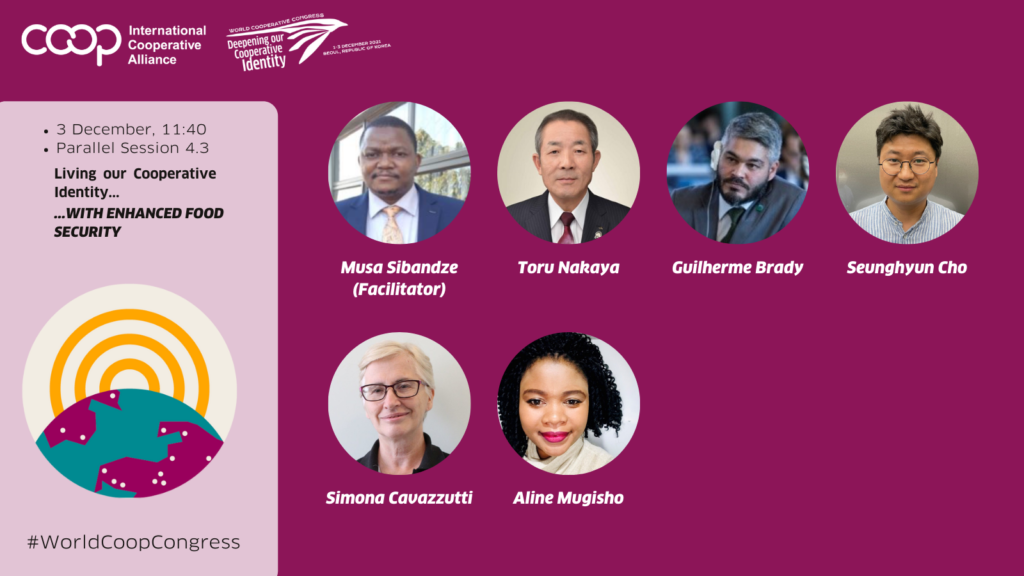
How do cooperatives address new ways to ensure production in food systems, and how does this contribute to building sustainable, ethical and inclusive value chains? These questions were explored in parallel session 4.3, entitled Living Our Cooperative Identity With Enhanced Food Security, on the final day of the World Cooperative Congress.
Facilitating the session was Musa Sydney Sibandze, President of the Eswatini Farmers’ Cooperative Union, who laid out challenges currently faced with the global food system, including climate change, drought, flooding and refugee displacement, and the disruption of the chains of production and distribution. He invited panelists to explore how cooperatives can address new ways to ensure production in food systems and what can be to ensure a sustainable, ethical and inclusive food system.
Dr. Seunghyun Cho, researcher at NongHyup Economic Research Institute at the Korean National Agricultural Cooperative Federation, stressed the need to find ways to stabilise the supply and prices of food. He went on to say that by increasing participation in agricultural production, we can increase productivity and concentrate tech, policy, institutions and finance for a food system that can stabilise prices.
Guilherme Brady, Head of the Unit for Family Farming Engagement and Parliamentary Networks within FAO Partnerships and the UN Collaboration Division, spoke about an urgent need to change the way we produce and supply our food, and highlighted the key functions that coops can contribute to new food systems, including inclusive services for members and advocacy for workers through democratic governance models.
Sharing a message with the session, Simona Cavazzutti from The Confederation of Rural Cooperatives of Paraguay said that she had seen cooperatives responding to the covid-19 crisis by engaging both downwards with members and upwards with world agriculture food systems, strengthening the fundamental cooperative principles.
Mr Sibandze also shared some key points from Aline Mugisho from the Nigerian Innovative Youth in Agriculture Project, calling for easier access to finance for young farmers and a greater role for young people in policy making.
Panellist also gave recommendations as to how agricultural cooperatives could contribute to SDG 2 (Zero hunger) and SDG12 (responsible consumption and production).
Dr. Cho believes that in order to meet these goals, there needs to be a distribution system which reduces inequalities, as well as a circular economy. He identified two priorities that need to be considered: data and eco-friendly food systems, adding that “in order to have a circular economy food system, we will need data. We will need to have data for each node of the system, and each stakeholder should standardise the data … In order to have eco-friendly food systems we need to be able to have the right pricing, so we should be providing agricultural equipment to farms at lower prices so that we can have profitability for eco-friendly food.”
Mr Nakaya described how the Japanese government has pledged to increase organic farming. “As agricultural cooperatives based on SDG 12, we think it is impossible to expand organic farming without the understanding of consumers,” he said. Therefore we are strengthening our partnerships with consumer cooperatives and promoting campaigns for more support and understanding from consumers.”
Mr Brady also spoke of a need to narrow the gap between producers and consumers in order to benefit from a growing market that values social, environmental and cultural identities, concluding that having a strong identity would make cooperatives better positioned to participate in these growing markets.
